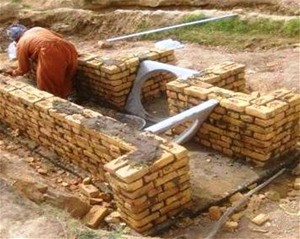
Construction of an efficient, reinforced concrete cement turnout.
USAID/AWATT
Farm turnouts that divert water from canals will save farmers strenuous manual labor and provide efficient water delivery to fields.
11 OCTOBER 2010 | BALKH PROVINCE, AFGHANISTAN
Haji Ghafoor is a farmer located in the Balkh canal irrigation system, where water allocation is done by farmers who take weekly turns irrigating their fields. Each farmer is allotted a limited amount of time to access the canal in proportion to his landholdings.
Irrigating his farm has been a strenuous job for Ghafoor. Once a week, he goes to the canal with his shovel, digs an opening in the earthen “bunds” to divert water to his fields, and closes them when his turn is complete. He repeats this strenuous process for as many fields as he can during his allotted time.
Until now, that’s how farm level irrigation worked in Balkh. In September 2010, Haji Ghafoor, assisted by USAID’s Afghanistan Water, Agriculture, and Technology Transfer program (AWATT), was among the first Afghan farmers to have “turnouts” installed on the watercourses that feed their fields.
Turnouts are light, reinforced-concrete cement frames with leak-proof lids installed in concrete-covered brick channels. They are among the many water-efficient technologies being introduced by AWATT, a three-year program that works closely with Afghanistan’s Ministry of Agriculture, Irrigation and Livestock (MAIL) to help Afghan farmers get maximum use of available water.
“It’s a good way for me to water my fields,” says Ghafoor. “It has made my life much easier.” At approximately $250 per turnout with an estimated 20-year lifespan, the system is also affordable.
AWATT is the first USAID program to introduce canal turnouts. The technology is imported from the United States via Pakistan, where USAID initially introduced it. This is the first time Afghans have had such efficient crop water delivery.
By the end of February 2011, AWATT will have installed approximately 500 turnouts to farmers’ fields in Balkh and Nangarhar provinces. MAIL has responded enthusiastically and is discussing nationwide replication. Meanwhile, AWATT has been training dozens of MAIL engineers to plan, design, and install these farm turnouts, and teach how they work. Coupled with other water-saving technology, such as laser land-leveling, farmers like Haji Ghafoor can expect crop yield increases of at least 50 percent.







Comment
Make a general inquiry or suggest an improvement.